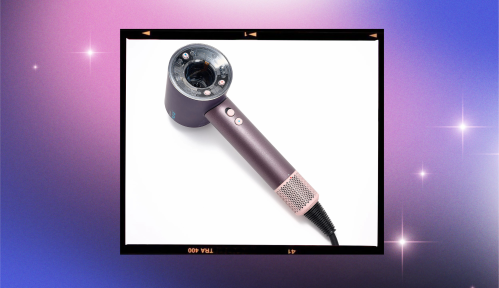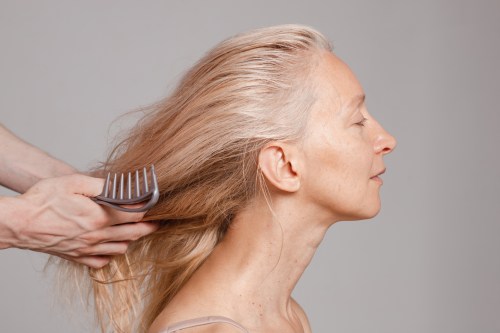Our editors independently select these products. Making a purchase through our links may earn Well+Good a commission
3 Types of Hair Loss That May Be Related to Stress, and How to Reduce the Effects of Each
Discover the signs and symptoms of stress hair loss, and how to reduce the effects of stress for healthier hair, according to a derm.

For anyone with long hair, shedding is a natural part of life. A few strands in your hairbrush or the shower drain is nothing to worry about—you’ve got hundreds of thousands of ’em on your head, after all. But if you’re pulling out hair by the fistful or waking up with a full-blown nest on your pillow every morning, it could be a sign that you’re losing your hair due to stress.
Experts in This Article
a board-certified dermatologist with Westlake Dermatology in Texas.
Here, a board-certified dermatologist explains how to identify stress hair loss, how it’s different from other medical causes, and what to do to treat it.
Symptoms of hair loss due to stress
Hair loss can happen for many reasons—age, genetics, medical conditions, and even certain hairstyles can play a role. But stress-related hair loss is in a category of its own. “Hair loss due to stress and anxiety can manifest in various ways,” says Miriam Hanson, MD, a board-certified dermatologist for Westlake Dermatology in Texas. “Some common symptoms include thinning hair, sudden loss of patches of hair, increased shedding, a reduction in overall hair volume, and/or changes in hair texture.”
According to the Mayo Clinic, hair loss that comes from stress doesn’t have to be permanent. Your hair may grow back as long as you can manage the effects of stress on your body. In other words, we know stress is often unavoidable, but learning how to cope with it is possible.
3 types of stress-related hair loss
Not all stress-related hair loss is the same. The most common type is telogen effluvium, Dr. Hanson says. “This type is caused from hair prematurely entering the shedding phase. The hair sheds for three to six months and then will often recover on its own.” Another common type is called alopecia areata. This type is linked to the immune system attacking the hair follicles, leading to bald patches of hair loss, per Dr. Hanson.
Finally, there is trichotillomania. This condition is caused from compulsively pulling out hair as a response to stress. In some cases, people do so without realizing it’s happening, per the Mayo Clinic. If you find you’re turning to hair pulling or skin picking to cope with stress, reach out to your doctor or a trusted mental health professional to learn healthier coping skills and support your emotional well-being.
Causes of stress-related hair loss
With so many stressors in everyday life, it can be difficult to narrow down what’s causing your strands to stray. “The level of stress required to trigger hair loss can vary greatly among individuals, as it depends on personal thresholds and other contributing factors such as genetics, overall health, and lifestyle,” Dr. Hanson says.
“It is often linked to significant stressful events, such as divorce, job loss or death of a loved one, chronic stress, or a physical stress, such as an illness, surgery, or significant weight changes,” he adds. Dr. Hanson also notes that stress-related hair loss usually happens after the stressful period has passed, sometimes three to six months later. So if your hair feels like it just keeps falling, this may be why.
Other causes of hair loss
As mentioned, stress isn’t the only reason why someone might lose their hair. There are a variety of medical reasons for changes in hair regrowth and strength. This can include the following, per the Mayo Clinic:
- Family history (hereditary): For some people, hair loss as they age runs in their family. This is called androgenic alopecia, or male-pattern or female-pattern baldness.
- Hormonal changes: Your hair’s thickness can drastically change with hormone fluctuations during pregnancy, childbirth and postpartum, and menopause.
- Medical conditions: Certain thyroid conditions can cause thinning hair, as well as scalp infections like ringworm. This is typically referred to as alopecia areata.
- Medications and supplements: Hair loss can be a side effect of meds for cancer, arthritis, depression, heart issues, gout, and high blood pressure.
- Radiation therapy to the head: This may cause your hair to grow back differently.
Additionally, certain hairstyles or hair treatments—like tight braids or cornrows—can cause a specific type of hair loss called traction alopecia. Hot oil treatments and perms can also cause your hair to fall out, per the Mayo Clinic.
How is stress hair loss diagnosed?
Hair loss related to stress can be formally diagnosed by a dermatologist. Their evaluation may involve taking down your medical history, doing a physical exam, and running other tests to help determine the best course of hair loss treatment. “During the medical history, the doctor will often ask about recent stressors, illness, and any family history of hair loss,” says Dr. Hanson. Your doctor may also take a closer look at your scalp and hair for patterns and types of hair thinning, which may include gently pulling on hair to see how many strands come out, she adds.
Blood tests can also help identify any underlying medical conditions that may contribute to hair loss, like thyroid issues, iron deficiency, or hormonal imbalances. “In some cases, a small sample of scalp tissue may be taken for microscopic examination. This can help differentiate between different types of hair loss and rule out other scalp conditions,” says Dr. Hanson.
Additionally, your doctor might also ask you to collect fallen hairs over a period of time to evaluate the amount and type of shedding. This can help them determine if stress is a factor contributing to hair loss and recommend treatments or lifestyle changes to address it. “Early intervention can often lead to better outcomes and help manage the condition more effectively,” Dr. Hanson says.
How to manage stress (and stop losing hair)
If stress is what’s stopping you from keeping your hair, well, it’s important to manage it. “To support hair regrowth and overall hair health, consider reducing stress by implementing stress-management techniques such as mindfulness, exercise, and proper rest,” Dr. Hanson says.
The American Psychological Association also recommends these proven techniques to relieve stress:
Eliminate stressors
This might not be possible for all areas of your life, but consider what factors can be taken out of the equation to lessen your load. Maybe it’s preparing for your day the night before, hiring help, or delegating tasks to someone else. Reflect on your biggest stressors and identify actionable ways to make those stressors less significant.
Ask for help
You don’t have to suffer with stress by yourself. In fact, one of the best stress-relief techniques is asking for support from your community. Having others to rely on (to either lend a helping hand or just listen) can lessen stress immediately. Plus, just sharing what’s stressing you can improve your mood.
Eat a well-balanced diet
“You are what you eat,” as the phrase goes. In this instance, eating a well-balanced diet—filled with vitamin-rich fruits, veggies, lean protein, and healthy fats—can help you feel better physically and emotionally, and help with hair growth. For example, adding more omega-3s to your diet (like salmon, avocado, walnuts, or flaxseeds) can be particularly helpful for hair and skin.
“Eating a healthy diet ensures a balanced diet rich in vitamins and minerals that promote hair health,” Dr. Hanson says. You can also ask your doctor about the best vitamins for hair loss due to stress.
Try meditating
Slowing down your thoughts through meditation can be particularly helpful to mitigate stress. No matter the type of meditation you choose to practice (i.e., guided imagery, mindfulness, moving meditation, etc.) research has shown it’s beneficial to mental health. In fact, a March 2014 study in JAMA Internal Medicine1 concluded that meditation can decrease anxiety when practiced over the span of at least eight weeks. (For some tips to get started, check out our Meditation 101 page.)
Get moving
You know that rush of happiness and energy you get after a workout? That’s no coincidence: Exercise can increase your brain’s production of “feel-good” neurotransmitters called endorphins, per the Mayo Clinic. So getting in regular sweat sessions by walking or going for a run, lifting weights, doing Pilates, or any other fav workout is a great way to counteract the effects of stress.
When to see a dermatologist
If you notice persistent hair loss for more than six months, you should see a dermatologist, Dr. Hanson says. Other symptoms that signal the need for a professional diagnosis are significant hair thinning or bald patches, rapid hair loss, and scalp health issues, like itching, redness, scaling and/or if the hair loss is causing significant emotional distress.
FAQ
Is stress-related hair loss permanent?
Stress-related hair loss is typically not permanent, Dr. Hanson says. If stress-related hair loss persists beyond a few months, reaching out to a health care provider or dermatologist can help identify the underlying cause and appropriate treatment options.
Which vitamin deficiency causes hair loss?
According to Harvard Health, if you’re deficient in iron, vitamin A, or vitamin D, it can lead to hair loss. These vitamins and minerals are responsible for hair growth and creating the cells that develop into hair follicles. A doctor can determine if you have deficiencies through a blood test.
What does stress hair look like?
You may be wondering: What does hair loss from stress look like? According to Dr. Hanson, “stress hair” can look thin, or create bald patches on your scalp. There’s also a difference between shedding and thinning hair from either stress or other health-related issues. Your doctor will be able to determine this through a comprehensive examination.
—reviewed by Jennifer Logan, MD, MPH
Goyal, Madhav et al. “Meditation programs for psychological stress and well-being: a systematic review and meta-analysis.” JAMA internal medicine vol. 174,3 (2014): 357-68. doi:10.1001/jamainternmed.2013.13018
↩︎
Sign Up for Our Daily Newsletter
Get all the latest in wellness, trends, food, fitness, beauty, and more delivered right to your inbox.
Got it, you've been added to our email list.










